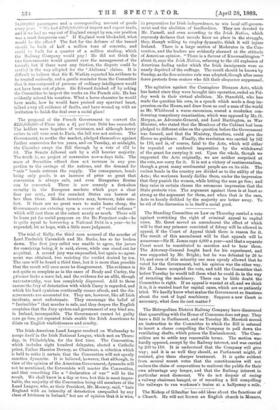The agitation against the Contagious Diseases Acts, which has lasted
since they were brought into operation, ended on Fri- day week in their virtual abolition, Mr. Stansfeld, who has made the question his own, in a speech which made a deep im- pression on the House, and drew from so cool a man of the world as Mr. Whitbread a warm encomium, moved a resolution con- demning compulsory examination, which was opposed by Mr. 0- Morgan, as Advocate-General, and Lord Hartington, as War Minister, who stated that the Members of the Cabinet had been- pledged to different sides on the question before the Government- was formed, and that the Ministry, therefore, could give the- House no guidance. Finally, the resolution was carried by 182 to 110, and is, of course, fatal to the Acts, which will either- be repealed or rendered inoperative by the withdrawal- of the grant for carrying it out. Upon the whole, though we supported the Acts originally, we are neither surprised at- the vote, nor sorry for it. It is not a victory of sentimentalism, though a great many sentimental people are on its side. The coolest heads in the country are divided as to the utility of the- Acts ; the workmen keenly dislike them, under the impression, that they punish the women, while letting the men go free; and they raise in certain classes the erroneous impression that the State protects vice. The argument against them is at least as strong as the argument for them, and when that is the case, Acts so keenly disliked by the majority are better away. To- be rid of the discussion is in itself a social good.


































 Previous page
Previous page